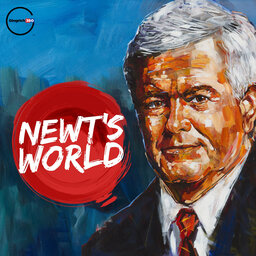Episode 756: Contract with America – 30th Anniversary
On the 30th anniversary of the Contract with America, Newt discusses the historical significance of the Contract, a pivotal moment in U.S. political history. He talks about his leadership aspirations upon his arrival in Congress, which culminated in the Republican Revolution of 1994. This revolution marked the end of 40 years of Democratic control in the House of Representatives, leading to significant reforms such as welfare reform and a balanced federal budget. Newt underscores the strategic planning and team effort behind the Contract with America, emphasizing its role in shifting the balance of power in Washington and its lasting impact on American politics.
In 1 playlist(s)
Newt's World
Join former House Speaker, professor, historian, and futurist Newt Gingrich as he shares his lifetim…Social links
Follow podcast
Recent clips

Episode 948: ‘Moneyball’ for Politics
30:34

Episode 947: Will AI Take My Job
28:22

Episode 946: Peter Schweizer on “The Invisible Coup”
34:50
 Newt's World
Newt's World